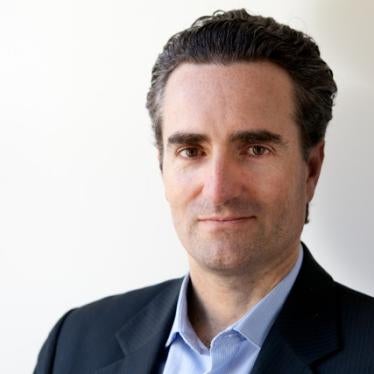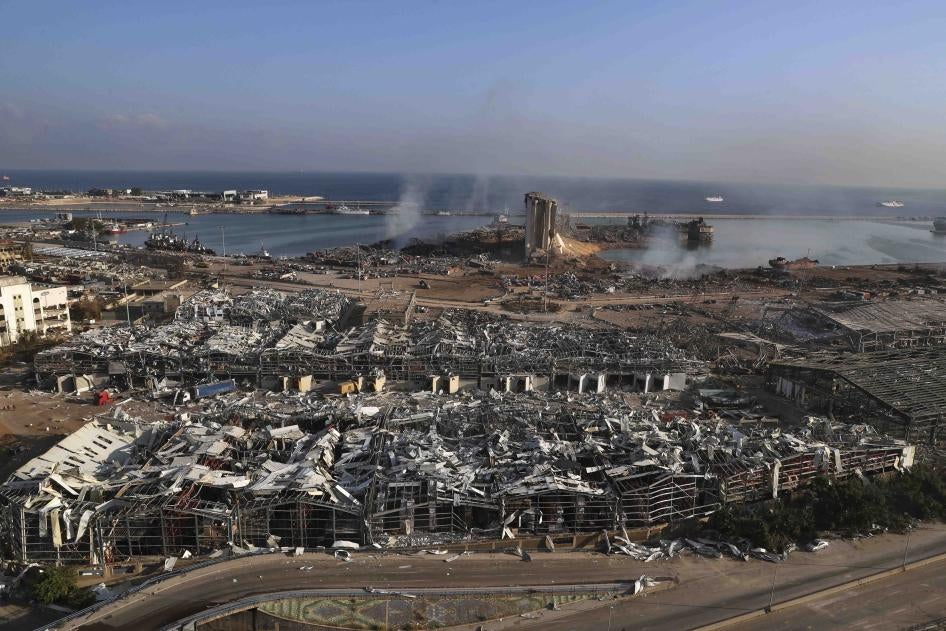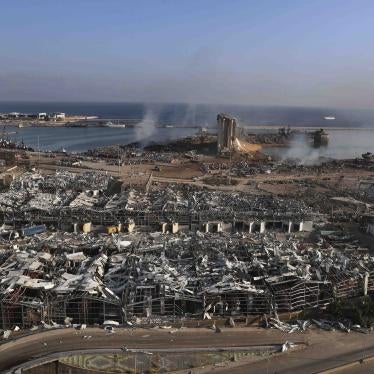As Lebanon continues to suffer in the aftermath of the August 4 explosion in the port of Beirut, France should use its considerable leverage in Lebanon to ensure that there is an independent international investigation into the blast. Attempts by local politicians to assign an inquiry to local institutions are unacceptable, due to repeated failures by Lebanese authorities to investigate serious past government failings and generalized public distrust of government institutions.
The judiciary lacks the required credibility to conduct a transparent investigation on its own. Political interference in the judiciary has been customary for years, including in instances documented by Human Rights Watch, and initial evidence suggests that some judges were aware of the ammonium nitrate negligently stored in the port that caused the explosion.
President Emmanuel Macron was prompt to arrive on the scene and promise international assistance. After walking through a gutted neighborhood and greeting affected people, he was remarkably direct in calling for “profound change” leading to a “new political order,” alerting Lebanese politicians that “the time for responsibility has arrived.”
Having positioned himself as the self-anointed leader of the international response to the explosion, President Macron should not miss the opportunity to demand full accountability. To begin with, he should support calls for an independent investigation with the participation of international experts– including the UN special rapporteur on management and disposal of hazardous substances and waste– to determine the cause of the explosion and who is responsible for the unlawful deaths of at least 177 people, and counting.
The investigation should look into why and how 2,750 tons of highly combustible and potentially explosive material were stored for over six years in close proximity to densely populated areas of Beirut, who knew about the long-term storage and failed to act, and what triggered the explosion. France, and other development partners, should also demand that the Lebanese authorities and all relevant actors give the international investigators full and unhindered access to all the evidence they need and comply with any recommendations concerning accountability for the explosion. The international community should also commit to fund the inquiry as needed.
President Macron also led an emergency donor conference to assist Lebanon on August 10 –where states pledged 253 million euros to support food security, housing, and education– promising that the financial aid would be “directly delivered to the Lebanese population.” Macron said additional funds for reconstruction would hinge on political and economic reforms.
Over the last 20 years, France has organized four donor conferences for Lebanon, which have yielded over $20 billion in aid to the country. Yet there has been no meaningful political or economic reform in return, despite repeated promises, and the benefits of the aid money did not trickle down to the population whose economic situation has declined dramatically over the past several years.
Just weeks before the August 4 explosion, Lebanese politicians were unable to agree on the scale of Lebanon’s financial losses and implement the reforms necessary to unlock billions of dollars from the International Monetary Fund and the international community. Meanwhile, inflation was skyrocketing, the currency was depreciating rapidly, and more and more people were being plunged into poverty.
This time France, and the international community, should be unforgiving in demanding a reform plan that uproots the sectarian-based “spoils system” that has corrupted state building and entrenched inequality since, at least, the 1989 Taif Agreement that ended the civil war in Lebanon. They should also be unforgiving in demanding improved governance and delivery of social services, as well as reforms to the delipidated electricity system and anti-corruption measures to tackle the growing poverty that has decimated most of the population.
The devastating impacts of the explosion will scar Lebanon for years to come. The victims and their families deserve prompt and independent justice for the criminal negligence shown with the storage of the ammonium nitrate. They also deserve answers that only an investigation led by international experts can deliver. A domestic investigation conducted by a corrupt and incompetent state will likely result in a mushroom-cloud of impunity.










